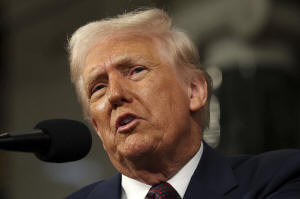Trump casts doubt on NATO solidarity, despite it aiding the US after
Sept. 11
[March 07, 2025]
By MICHELLE L. PRICE
WASHINGTON (AP) — President Donald Trump on Thursday expressed
uncertainty that NATO would come to the United States’ defense if the
country were attacked, though the alliance did just that after Sept. 11
— the only time in its history that the defense guarantee has been
invoked.
Trump also suggested that the U.S. might abandon its commitments to the
alliance if member countries don't meet defense spending targets, a day
after his pick for NATO ambassador assured senators that the
administration's commitment to the military alliance was “ironclad.”
Trump’s comments denigrating NATO, which was formed to counter Soviet
aggression during the Cold War, are largely in line with his yearslong
criticism of the alliance, which he has accused of not paying its fair
share toward the cost of defense. But they come at a time of heightened
concern in the Western world over Trump’s cozy relationship with Russian
President Vladimir Putin, who has long seen NATO as a threat, and as the
U.S. president seeks to pressure Ukraine into agreeing to a peace deal
with the country that invaded it three years ago.
Defense Secretary Pete Hegseth sent the alliance into upheaval last
month when he said in a speech that the U.S. would not participate in
any peacekeeping force in Ukraine, which is not a NATO member, and would
not defend any country that participated in it if attacked by Russia.
Trump said Thursday in the Oval Office that other countries would not
come to the defense of the U.S. — though they have done exactly that, in
the only instance that the Article 5 defense guarantee was invoked.

“You know the biggest problem I have with NATO? I really, I mean, I know
the guys very well. They’re friends of mine. But if the United States
was in trouble, and we called them, we said, ‘We got a problem, France.
We got a problem, couple of others I won’t mention.' Do you think
they’re going to come and protect us? They’re supposed to. I’m not so
sure.”
Article 5 was invoked after the Sept. 11, 2001, attacks, leading to
NATO’s largest operation in Afghanistan. France’s military participated
in the operation.
"We are loyal and faithful allies,” French President Emmanuel Macron
responded Thursday, expressing “respect and friendship” towards U.S.
leaders.
“I think we’re entitled to expect the same,” he said.
Macron invoked “centuries-old history," namechecking the Marquis de
Lafayette, a 19-year-old French nobleman, who was a major-general in the
American Continental Army during the Revolutionary War, and Gen. John
Pershing, commander of the American army in France during World War I.
Macron added that a few days ago, he met American World War II veterans
who landed on Omaha Beach as part of the D-Day invasion of Nazi-occupied
France.
France and the U.S. “have always been there for each other,” Macron
said.
[to top of second column]
|

President Donald Trump addresses a joint session of Congress at the
Capitol in Washington, Tuesday, March 4, 2025. (Win McNamee/Pool
Photo via AP)

Trump, when asked Thursday if it he was making it U.S. policy that
the U.S. would not defend NATO countries that don’t meet military
spending targets, said: “Well, I think it’s common sense, right? If
they don’t pay, I’m not going to defend them. No, I’m not going to
defend them.”
Trump has suggested since his 2016 presidential campaign that the
U.S. under his leadership might not comply with the alliance’s
mutual defense guarantees and would only defend countries that met
targets to commit 2% of their gross domestic products on military
spending.
The U.S. is the most powerful nation of the seven-decade alliance,
has the largest economy among members and spends more on defense
than any other member.
The U.S. was one of 12 nations that formed NATO following World War
II to counter the threat posed by the Soviet Union to Western Europe
during the Cold War. Its membership has since grown to 32 countries,
and its bedrock mutual defense guarantee, known as Article 5, states
that an attack on one member is considered an attack on all.
Trump on Thursday also seemed to suggest the U.S. commitment to NATO
might be leveraged in his trade war as he seeks to target what he
says are unfair trade policies with other nations, including the
European Union.
“I view NATO as potentially good, but you’ve got to get, you’ve got
to get some good thinking in NATO. It’s very unfair, what’s been
happening," Trump said. “Until I came along, we were paying close to
100% of NATO. So think of it, we’re paying 100% of their military,
and they’re screwing us on trade.”
On Wednesday, Trump’s choice for NATO ambassador, Matt Whitaker,
said at his confirmation hearing that in regards to the U.S.
commitment to the NATO alliance and specifically Article 5, “it will
be ironclad.”
Last year, NATO’s Secretary-General Jens Stoltenberg said a record
23 of NATO’s 32 member nations had hit the military alliance’s
defense spending target.
Trump has taken credit for countries meeting those targets because
of his threats, and Stoltenberg himself has said Trump was
responsible for getting other nations to increase their spending.
___
Associated Press writer Sylvie Corbet in Brussels contributed to
this report.
All contents © copyright 2025 Associated Press. All rights reserved |